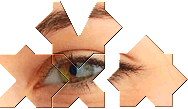AJ's Response:
Well, first of all, what is weird? I mean
the way we define that has all to do with how
we will experience it. I think that everyone
feels "weird" in the sense of being different
from time to time. There is nothing, however,
that is written in stone or law that says
being different is "wrong".
I think that people define weird as anything
that is different from them. After this distinction
is made people and usually groups of people adhering
to similar "norms" (beliefs, values etc) will then
place a value judgment on what they've defined as
"weird" or different.
Make no mistake about it, being different, does
NOT make you wrong and those who would judge
you right. Being different (or weird as you say you
feel) does not make you "less than" at all either.
Having Borderline Personality Disorder is not the
same as "not" having it, granted. There are distinctions
and differences in experience and (often) in behaviour.
This does not mean that there is a "right" way and a
"wrong" way to be, however. Having BPD isn't "wrong"
anymore than not having it is "right". There is a lot
of damage done to those with any mental illness by this
faulty line of thought (largely society's as well) which
seems to place worth on whatever it says "mental health"
is and a lack of worth (and understanding) on what is
defined as "mental illness."
Having a mental illness or handicap is not much
different in many ways from having a physical medical
condition that needs to be managed and taken care of.
People fear what they do not know or understand. People
fear what hurts them. Often for many who have experienced
someone with BPD or any other form of mental illness, they
can't understand, and they have been hurt, therefore there
fear is at least two-fold. Even those without personality
"disorders" will erect boundaries, judgments and so forth
based upon the illogical fears born from a negative experience.
It is easier to do this and to blame rather than make
the distinction between a person and their behaviour or to
make the distinction that whatever separates those with BPD
and without it is often a very thin line.
For those with BPD it can be difficult to get to
know who you really are. In the absence of this
self-knowledge (often sub-consciously) you may then
take on the definitions given to you, of you, by others.
Here is where you need to replace the words, judgments
etc of others with your own self-worth.
What you can do is work at your own level of self-esteem
and work to value yourself. Learn to define who you are
from the inside out, instead of from the outside in. You
can choose to not let people who judge you and or believe you
are weird to have any power over you. Define yourself and
always, always, hold your head up and be proud of yourself.
This response is © A.J. Mahari, February 2003
Mail Bag Main Page

